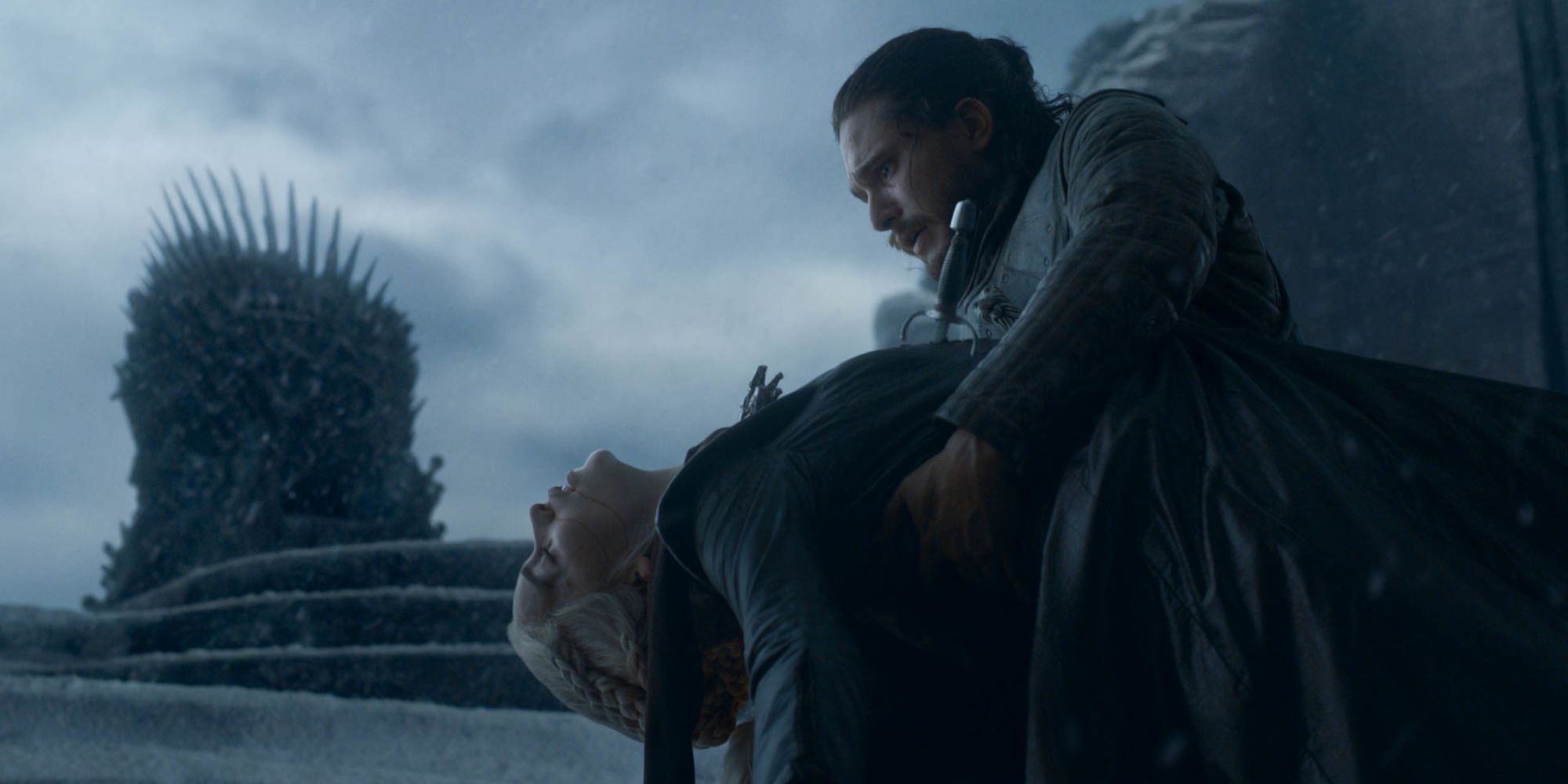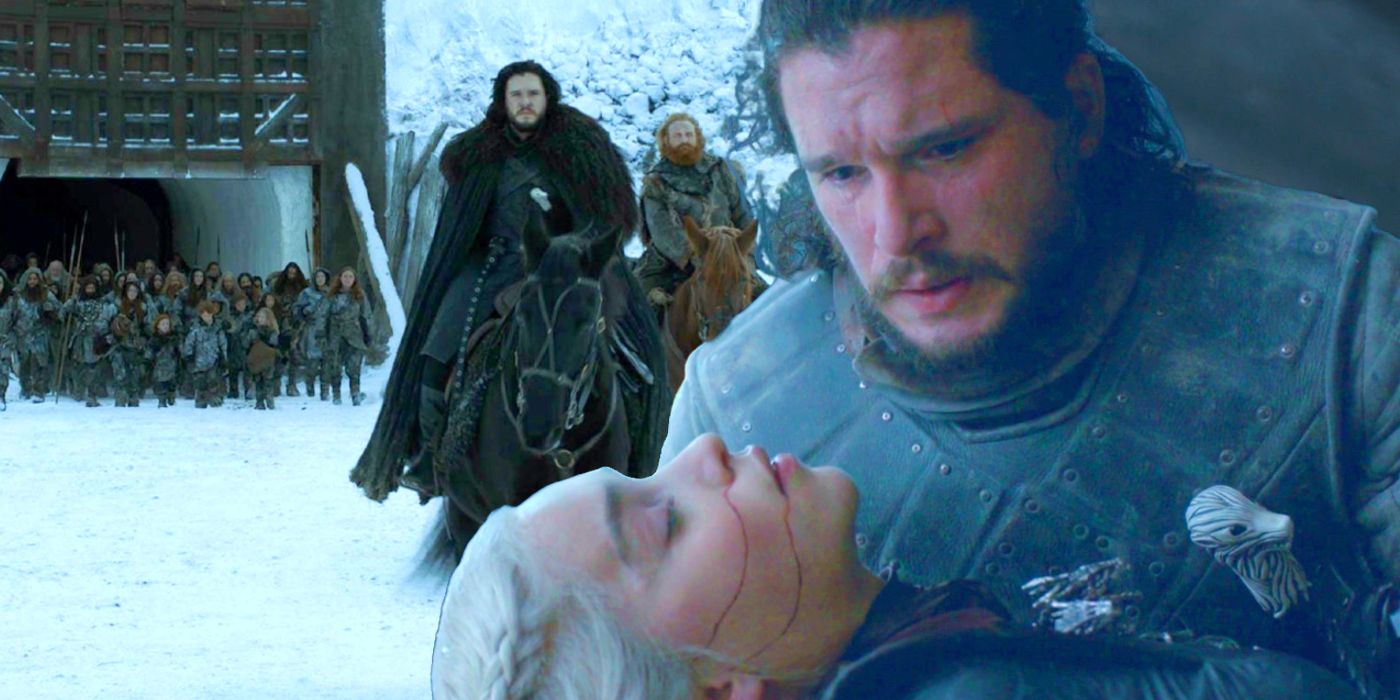Jon Snow’s divisive Game of Thrones ending failed a specific honorable legacy left by both Ned Stark and House of the Dragon’s Cregan Stark.
WARNING! This article contains major SPOILERS for House of the Dragon and George R.R. Martin’s book, Fire & Blood!House Stark is no stranger to rebellion in Game of Thrones’ history, but Jon Snow’s most unforgivable act of defiance betrayed the legacy left by the honorable Ned and Cregan Stark. Game of Thrones often emphasizes the importance of familial legacies and maintaining the values of one’s house, with Jon Snow eventually being caught between loyalties to his Stark and Targaryen heritage. While Jon Snow lived his life in Game of Thrones trying to emulate the code of honor, respect, and leadership displayed by Ned Stark, Jon was stripped of this reputation when killing Queen Daenerys Targaryen.
With Lord Cregan Stark set to appear in House of the Dragon season 2, House Stark’s history will be better explored in the prequel series. Many comparisons will be drawn between House of the Dragon’s young and brutal Cregan Stark and Game of Thrones’ honorable Ned Stark. Similar to how Ned played a significant role in fighting back against the sitting Targaryen ruler in Robert’s Rebellion, Cregan will join Rhaenyra Targaryen in fighting back against King Aegon II Targaryen. Rebellion is thus no crime for House Stark, but when Jon Snow rebels against Queen Daenerys Targaryen in Game of Thrones, he fails a critical wartime value preached by his ancestors.
RELATED:Who Would Ned Stark Support In Dance Of The Dragons: Rhaenyra Or Aegon?
Jon Broke House Stark’s Rebellion Rule Against Kingslaying
Jon Snow failed the rebellious legacies of Ned and Cregan Stark when he murdered Queen Daenerys Targaryen, the Iron Throne’s ruler. Ned and Cregan both rebelled against the Iron Throne, similar to how Jon did in Game of Thrones’ series finale, but the honorable Lords of Winterfell were strongly against the crime of kingslaying. In Game of Thrones, the Mad King Aerys murdered Ned’s father and brother, but Ned refused to kill the man who sat on the Iron Throne. Similarly, Cregan Stark declared kingslaying dishonorable, later ordering the execution of anyone who played a part in the poisoning of King Aegon II Targaryen – even though Cregan was a fierce supporter of Queen Rhaenyra Targaryen.
When Ned saw Jaime Lannister after he stabbed Aerys in the back, Ned simply referred to the knight as “Kingslayer” for the rest of his days. Cregan similarly saw the deaths of many Northmen in House of the Dragon’s war, and even refused to kill Aegon after the King murdered Rhaenyra. When discovering that the Greens Larys Strong and Corlys Velaryon conspired to kill Aegon, Lord Cregan Stark lost any respect or mercy for these men. According to George R.R. Martin’s Fire & Blood book, Cregan shamed the Sea Snake by preaching that “Aegon was an oathbreaker, a kinslayer, and a usurper, yet still a king.”
House Stark would try to remove certain Targaryen rulers from the Iron Throne, but wouldn’t stoop to the dishonorable act of killing a king or queen. As such, if Ned and Cregan had learned that their descendant Jon Snow murdered his queen, they would be deeply ashamed of him. Jon tried to live an honorable life, but killing Daenerys Targaryen was inexcusable in the eyes of House Stark’s greatest leaders.
Jon Killing Daenerys Betrayed His Stark & Targaryen Ancestors
House Targaryen’s history indicates that many of its leaders would have supported Daenerys’ actions in taking the Iron Throne. Even if they didn’t agree with Daenerys’ tyrannical act of burning King’s Landing, the Targaryens wouldn’t have agreed to the act of kinslaying displayed by Jon Snow. Even House of the Dragon’s Rhaenyra Targaryen, who likely would have considered Daenerys’ actions far too extreme, would have punished Jon Snow for brutally killing his aunt. Killing Daenerys wasn’t simply a betrayal of House Stark’s values, but also a failure in regard to queenslaying and maintaining House Targaryen’s legacy.
RELATED:House Of The Dragon’s Starks Will Break A Game Of Thrones Curse
Jon Snow is considered the Prince That Was Promised, as foreseen by Aegon the Conqueror, who would save mankind from the cold and dark. While Aegon’s dream didn’t predict that a Targaryen would sit on the Iron Throne after the White Walkers were defeated, Jon murdering Daenerys wasn’t the right way to prevent the family’s continued rule. When Daenerys took the Iron Throne, House Targaryen was in the most vulnerable position it had been since the Dance of the Dragons, yet Jon threw away the family’s legacy, dragon power, and future after taking poor advice from Tyrion.
House Stark’s History Means Jon Had To Go To The Wall
Ned and Cregan were fiercely opposed to kingslaying or queenslaying, and their punishments were sentenced accordingly. Jon’s ancestor Cregan Stark ordered the deaths of numerous people in King’s Landing, but allowed them to live under one exception: They must take the Black and join the Night’s Watch. Nearly every single person sentenced to execution opted to join the Night’s Watch, with the exceptions of Larys Strong and Ser Gyles Belgrave, who accepted their beheadings, and Lord Corlys Velaryon, who was pardoned. Likewise, Ned argued to Robert that Jaime should have been sent to the Night’s Watch for killing Aerys. As such, joining the Night’s Watch is the only way Starks will allow one to escape execution for kingslaying.
Jon Snow ended up being sent to the Wall for killing Daenerys in Game of Thrones’ ending, so his fate was fitting for his family’s history. Despite the fact that Sansa and Arya protested his exile, obeying the values of House Stark’s ancestors meant sending him to the Wall was the right call. In Jon Snow’s Game of Thrones sequel series, he’ll have to further reckon with his trueborn Targaryen and Stark heritage and how they impact his decision to kill Queen Daenerys Targaryen.










